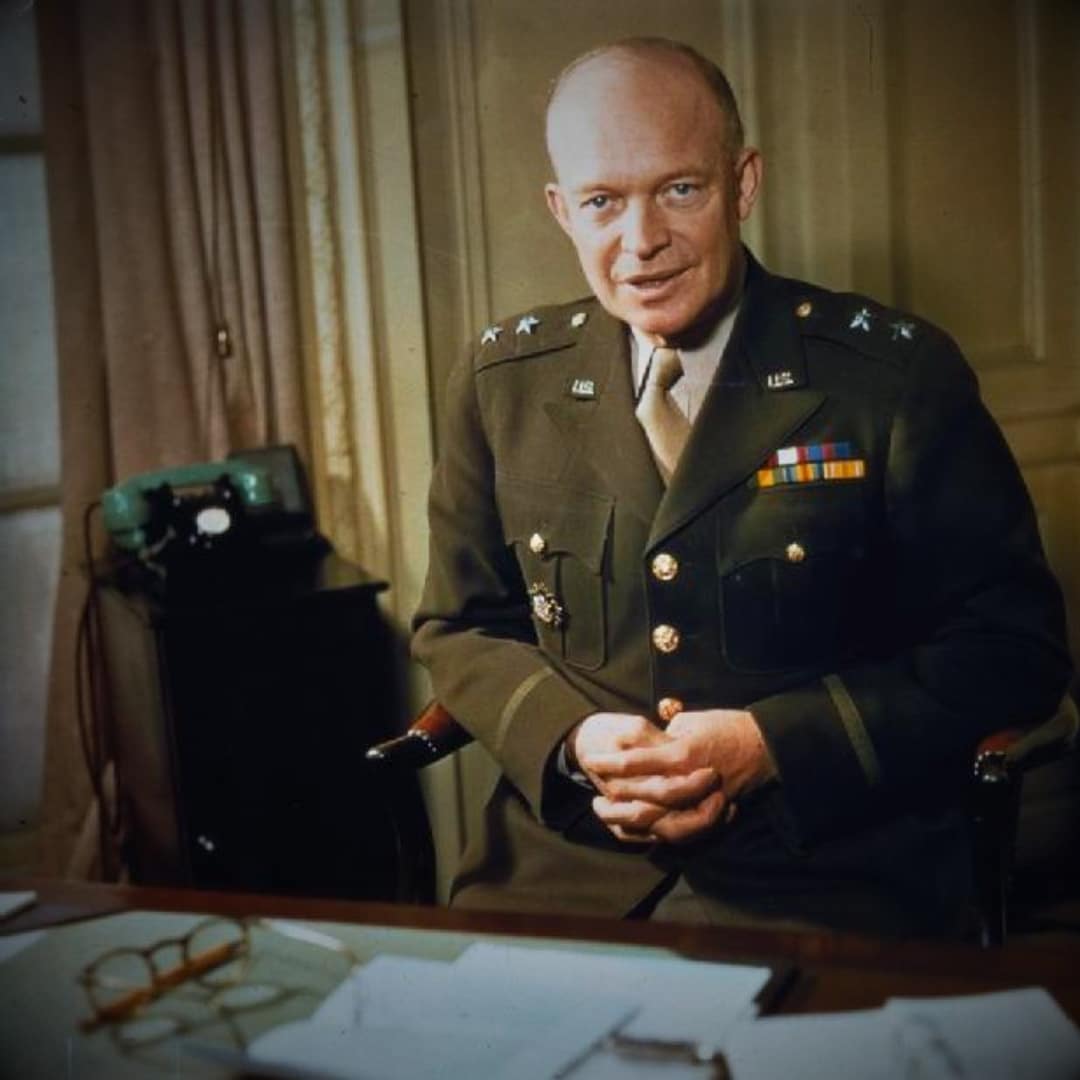
Dwight Eisenhower was a pivotal leader during World War II. Most notably, he served as the Supreme Commander of the Allied Expeditionary Forces for the D-Day invasion. His strategic acumen extended into the Cold War with innovative diplomacy and nuclear deterrence. Known for uniting Allied forces, Eisenhower's leadership guaranteed victories and shaped global post-war strategies. His legacy as a military strategist offers valuable lessons in leadership and strategic foresight in times of global conflict.
Dwight Eisenhower and his journey to becoming a renowned general was deeply rooted in his military education and distinctive leadership style. Graduating from the United States Military Academy at West Point in 1915, Eisenhower ranked 61st out of 164, demonstrating early promise. His initial posting at Fort Sam Houston marked the start of a career characterized by strategic foresight and organizational skill.
Though he did not see combat in World War I, his experience commanding the 301st Heavy Tank Battalion laid a foundation for future leadership. The interwar years saw Eisenhower refine his tactics through initiatives like the Transcontinental Motor Convoy.
Moreover, his leadership style was further molded while assisting General Douglas MacArthur in training the Philippine army, showcasing his ability to lead and inspire.
As the Supreme Commander of the Allied Expeditionary Forces, Eisenhower orchestrated one of the most complex military operations in history: the D-Day invasion.
Appointed just months earlier in December 1943, he meticulously planned Operation Overlord, emphasizing D-Day logistics to guarantee the smooth coordination of troops, equipment, and supplies across the English Channel.
His strategic vision required seamless cooperation with leaders like Winston Churchill and Franklin D. Roosevelt, aligning the diverse Allied forces under a unified strategy.
Eisenhower's personal commitment to troop morale was evident when he visited paratroopers on the eve of the invasion, offering encouragement and solidarity.
Accepting full responsibility for its outcome, he demonstrated exceptional leadership, contributing to the success of the Normandy invasion and solidifying his military legacy.
Eisenhower's success in orchestrating the complex Operation Overlord set the stage for his broader role in unifying the Allied forces. Appointed Supreme Commander of the Allied Expeditionary Forces in December 1943, he excelled in military collaboration, bringing together diverse units from the United States, Britain, Canada, and other nations.
Earlier, his leadership was pivotal in aligning the allied strategy for coordinated operations, exemplified initially in Operation Torch's success in North Africa. Furthermore, Eisenhower's strategic vision included frequent consultations with leaders like Roosevelt and Churchill, ensuring synchronized military and political objectives.
His emphasis on mutual respect among commanders fostered cooperation, essential for the success of the Normandy invasion and subsequent operations across Europe, ultimately shaping the Allied victory in World War II.
Maneuvering through the complexities of the Cold War, Eisenhower's strategy hinged on a dual approach of containment and deterrence, prioritizing nuclear power as a cornerstone of national security.
He implemented containment strategies through diplomatic channels, significantly establishing the International Atomic Energy Agency in 1957 to promote peaceful nuclear energy use.
Eisenhower's "New Look" defense policy emphasized nuclear diplomacy by reducing traditional military forces while enhancing nuclear capabilities to deter Soviet aggression.
His strategic evaluation rejected direct military intervention in Vietnam, reflecting a preference for calculated restraint.
The armistice ending the Korean War underscored his commitment to reducing military conflicts.
Eisenhower's Cold War approach balanced formidable military strength with diplomatic efforts, shaping a nuanced U.S. foreign policy landscape.
Legacy serves as a proof to the enduring influence of Dwight Eisenhower's Leadership and Presidential Achievements. His strategic foresight during World War II, exemplified by the successful Normandy invasion, cemented his status as a master military strategist.
Shifting to a peacetime role, Eisenhower's leadership extended to the presidency, where he initiated transformative infrastructure projects, particularly the Interstate Highway System. This reflected his military insights into logistics and national connectivity.
Furthermore, his advocacy for the peaceful use of nuclear power led to the creation of the International Atomic Energy Agency, underscoring his commitment to global stability.
Numerous institutions and scholarships bear his name, while his presidential library in Abilene, Kansas, stands as a lasting evidence of his multifaceted legacy.
Eisenhower markedly enhanced military leadership and strategic planning. He orchestrated Allied forces during World War II, showcasing exceptional coordination in operations such as D-Day, and later shaped post-war defense structures as the first Supreme Commander of NATO forces.
The Eisenhower Strategy emphasizes effective coordination of Allied forces and logistical planning. It includes the Eisenhower Doctrine, fostering strategic partnerships through collaboration among nations, leveraging combined strengths for objectives, and influencing Cold War military policy and NATO's formation.
Eisenhower utilized the CIA for covert actions to influence global political landscapes. CIA operations under his administration included orchestrating coups in Iran and Guatemala, employing psychological warfare, and countering Soviet influence without direct military involvement.
During the Korean Conflict, Eisenhower focused on strategic military decisions to end hostilities. He signed an armistice, increased military spending, and adopted brinkmanship, using nuclear deterrence to support allies and contain communist expansion in Asia.
The legacy of Dwight Eisenhower as a military strategist and leader is firmly cemented in history. His exemplary skills in unifying and directing Allied forces during World War II, particularly the pivotal D-Day invasion, showcased his strategic genius.
As the first Supreme Commander of NATO, he played an essential role in shaping Cold War diplomacy. Eisenhower’s influence extended beyond the battlefield, leaving an indelible mark on military strategy and international relations, echoing through the corridors of history.